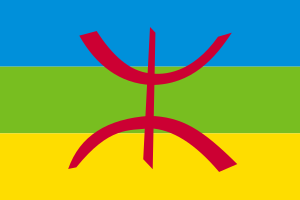Berber flag Total population
From Wikipedia, the free encyclopedia

| |
| Total population | |
|---|---|
| from 24[1][2] to 36 million [3] | |
| Regions with significant populations | |
| from ≈ 13 million [4] to ≈ 20 million[5][6][7][8] | |
| from 9[9] to ≈ 13 million[7][10] | |
| 1,620,000[11] | |
| 1,500,000[12] | |
| 850,000[13] | |
| 600,000 [14] | |
| 114,000[15] | |
| 110,000[16] | |
| 50,000[17] | |
| 34,000[18] | |
| 3,500[19] | |
| Languages | |
Berber languages:
also Modern Standard Arabic (Maghrebi Arabic), andFrench languageTarifit (Riffian) Tamazight Tashelhit (Shilha) Tuddungiyya (Zenaga) Tuareg Tashenwit (Shenwa) Taqbaylit (Kabyle) Tacawit (Shawiya) Tanfusit (Nafusi) | |
| Religion | |
| Predominantly Sunni Muslim Minority Irreligion and Ibadi | |
| Related ethnic groups | |
| other Afro-Asiatic peoples[20][21][22][23][24][25][26] | |
The Berbers or Amazighs (Berber: ⵉⵎⴰⵣⵉⵖⵏ Imaziɣen, singular: ⴰⵎⴰⵣⵉⵖ Amaziɣ/Amazigh) are an ethnic group indigenous to North Africa. They are distributed in an area stretching from the Atlantic Ocean to the Siwa Oasis in Egypt, and from the Mediterranean Sea to the Niger River. Historically, they spoke Berber languages, which together form the Berber branch of the Afro-Asiatic family. Since the Muslim conquest of North Africa in theseventh century, a large number of Berbers inhabiting the Maghreb have acquired different degrees of knowledge of varieties of the languages of North Africa. After the colonization of North Africa by France, "the French government succeeded in integrating the French language in Algeria by making French the official national language and requiring all education to take place in French."[27] Other foreign languages, mainly French and to some degree Spanish, inherited from former European colonial powers, are used by most educated Berbers inAlgeria and Morocco in some formal contexts, such as higher education or business.
Today, most Berber people live in Northern African countries, such as Algeria and Morocco;[1] a small Berber population is also found in Niger, Mali, Libya, Mauritania, Tunisia,[28] Burkina Faso and Egypt, as well as large immigrant communities living in France, Canada, Belgium, the Netherlands, Germany, and other countries ofEurope.[29][30]
The Berber identity is usually wider than language and ethnicity, and encompasses the entire history and geography of North Africa. Berbers are not an entirely homogeneous ethnicity and they encompass a range ofphenotypes, societies and ancestries. The unifying forces for the Berber people may be their shared language, belonging to the Berber homeland, or a collective identification with the Berber heritage and history.
There are some twenty-five to thirty million Berber speakers in North Africa.[1] The number of ethnic Berbers (including non-Berber speakers) is far greater, as a large part of the Berbers have acquired other languages over the course of many decades or centuries, and no longer speak Berber today. The majority of North Africa's population is believed to be Berber in origin, although due to Arabization most ethnic Berbers identify as Arabized Berbers.[31][32]
Berbers call themselves some variant of the word i-Mazigh-en (singular: a-Mazigh), possibly meaning "free people" or "noble men".[29] The name likely had its ancient parallel in the Roman and Greek names for Berbers, "Mazices".[citation needed]
Some of the best known of the ancient Berbers are the Numidian king Masinissa, king Jugurtha, the Berber-Roman author Apuleius, Saint Augustine of Hippo, and the Berber-Roman general Lusius Quietus, who was instrumental in defeating the major wave of Jewish revolts of 115–117. Dihya or Kahina was a female Berber religious and military leader who led a fierce Berber resistance against the Arab-Muslim expansion in North-West Africa. Kusaila was a seventh-century male leader of the Awraba tribe of the Berber people and head of theSanhadja confederation.
Famous Berbers of the Middle Ages include Yusuf ibn Tashfin, king of the Berber Almoravid empire; Tariq ibn Ziyad the general who conquered Hispania; Abbas Ibn Firnas, a prolific inventor and early pioneer in aviation; Ibn Battuta, a medieval explorer who traveled the longest known distances in antiquity; and Estevanico, an early explorer of the Americas. Well-known modern Berbers in Europe include Zinedine Zidane, a French-born international football star of Algerian Kabyle descent, Loreen the Swedish-born winner of Eurovision 2012 andIbrahim Afellay, a Dutch-born football player of Moroccan Riffian descent.[citation needed]
Etiquetas: Berber flag Total population

0 comentarios:
Publicar un comentario
Suscribirse a Enviar comentarios [Atom]
<< Inicio